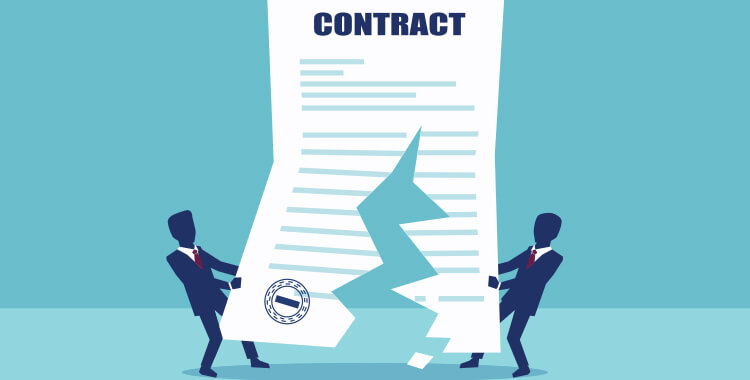
Oil and Gas Law: Let My Lease Go! In the Book of Exodus 5:1, Moses demands that the Pharaoh “let my people go.” After the Pharaoh refuses, God sends a series of plagues to Egypt to politely recommend that he change his mind. Under increasing pressure, the Pharaoh relents and lets the Israelites go.

In the Book of West Virginia, oil and gas landowners have demanded for years that companies “let my expired oil and gas leases go!” Like the Pharaoh, some oil and gas companies simply refused to record oil and gas releases to “let their leases go,” or, at best, did so only after months and multiple requests.
This was (and still is) a huge problem for West Virginia landowners. If an expired lease is not formally released (by filing a release with the county recorder’s office), a new company often refuses to take a new lease even though there is no dispute as to whether the prior lease had expired. That leaves West Virginia landowners in a quandary—I can’t lease my property without a release, and I can’t force the old company to give me a release. What to do?
Fortunately, the West Virginia legislature acted in 2020 and passed the Oil and Gas Lease Release Law, W.Va. Code § 36-4-9b. Unfortunately, the law is far from perfect and has very strict requirements related to what a landowner must do to obtain a release. The end result is very likely that if the law isn’t followed to a “T,” the oil and gas company has no legal obligation to do anything.
The Basics of the WV Oil and Gas Lease Release Law
The law provides that the oil and gas company (the “lessee”) must release a terminated, expired, or cancelled oil and gas lease within 30 days of termination, expiration, or cancellation. If the lessee does not, the landowner (the “lessor”) has to serve notice on the lessee that the lease has terminated, expired, or been cancelled. The lessee can dispute that the lease has terminated, expired, or been cancelled and provide a reason therefor, provide a release, or do nothing. If the lessee does nothing, the landowner can file an affidavit that the lease has terminated, expired, or been cancelled.

The Specifics of the WV Oil and Gas Lease Release Law
The Notice
The law first states that “[n]o later than 30 days after termination, expiration, or cancellation of an oil or natural gas lease, the lessee shall deliver to the lessor…a…release of such lease in recordable form.” However, “[i]f the lessee fails to provide a timely release…the lessor may serve notice on the lessee of lessee’s failure to provide such release.”
What does that notice contain?
It must contain a variety of information, that includes a statement that the lease is terminated, expired, or cancelled, including the date of termination, etc., that the lessee has a duty to provide a release, and that if a release (or challenge to) is not received within 30 days, the lessor has the right to file an affidavit of termination, etc.
Still with me? The notice must also contain the name and address of the lessor, a brief description of the land covered by the lease, “including without limitation, the state, county, tax district, tax map and parcel, watershed, historical farm name, or other identifying information.”
OK, what else? If there is a well on the land, it must include the name or API number of the well, if known. It must also contain the unit name if included in a unit and known by the lessor. Even more, the notice must contain recording information of the lease or memorandum of lease, along with the execution date of the lease, and the identity of the original lessor and lessee.
This notice must be sent by first class or certified mail to the lessee’s last known address. If the lessor cannot reasonably make service by those means, the lessor must publish a legal ad once a week for two weeks in a newspaper of general circulation.
The Lessee’s Options After Receiving the Notice
Upon receipt of the notice, the lessee can either (1) provide a release; or (2) it can challenge whether the lease has terminated, expired, or been cancelled. If a release is provided, great! However, if the oil and gas company challenges, they must only provide a “written challenge to the lessor…detailing the good faith basis for the dispute.” Who determines whether there is a “good faith basis for the dispute”? The oil and gas company does, and if you don’t agree, it’s up to you to sue them.

What if the oil and gas company does nothing after receiving your (hopefully) 100% correct notice that contains everything it legally must contain?
Congratulations! You can now record an affidavit that your lease has terminated, expired, or has been cancelled. Make sure you have your research handy, because your affidavit must contain the same variety of information that your notice (detailed above) must contain and more.
So, you’ve done all of the research, sent your notice, received no response, and have recorded your affidavit. Let’s assume you did everything 100% by the book.
What is the final outcome?
Is your oil and gas lease legally deemed terminated, expired, or cancelled? Is the affidavit simply rebuttable evidence that your lease is terminated, expired, or cancelled? No one knows! The law does not state what effect the affidavit has. Litigation and lawsuits will be had over these issues.
On the other hand, let’s assume you made a mistake with your notice and did not include the deed book and page number for your lease memorandum at the county recorder’s office. Or, you provided the tax map and parcel number of your land but the oil and gas company says you should have provided more information, namely the metes and bounds property description or the historical farm name. What then? Is your affidavit any good for any purpose? Again, I can easily see plenty of litigation and lawsuits over these issues.
My Take on the Law
In the end, my humble opinion is that the WV Oil and Gas Lease Release Law is unnecessarily burdensome on the landowner and designed to protect the interests of the oil and gas companies over the interests of landowners. Many landowners are capable of gathering all of the information and following the law to a “T”—many, many more simply are not.
GKT Oil and Gas Lawyers
If you’ve been told you need a release of your oil and gas lease, call GKT at (304) 845-9750 to talk to me or schedule a free, no-obligation appointment! I’ve been able to obtain releases on behalf of clients without this law by knowing who to talk to within the companies operating in our communities. And, if I can’t obtain a release without resorting to the WV Oil and Gas Lease Release Law, I know from where and how to gather all of the information necessary to force action and get a timely release.
Don’t let the oil and gas companies keep your minerals in limbo. Tell the oil and gas companies to “let my (oil and gas leases) go,” and call GKT today at (304) 845-9750!


